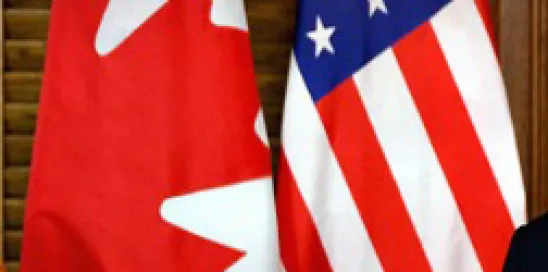The Inflation Reduction Act (“IRA”) has garnered criticism from the European Union (“EU”) due in large part to its domestic sourcing requirements.[1] Some in Canada have echoed this criticism, including Michael Harvey, vice president, policy & international of the Canadian Chamber of Commerce, who has warned that the IRA may damage Canadian global competitiveness.
However, significant parts of the IRA, as well as the Defense Production Act (“DPA”), consider Canadian businesses to be “domestic” sources. Consequently, Canadian companies are now presented with the opportunity to capture business and benefits resulting from these pieces of legislation. The past few years have seen close collaboration between the Biden and Trudeau administrations to boost cross-border trade, particularly for critical minerals needed to manufacture electric vehicle (“EV”) batteries and semiconductors. We explain the details of this cooperation and the way that Canadian companies are utilizing the IRA and DPA in this article.
Geostrategic Considerations Underlying US-Canada Critical Mineral Trade
To execute its green transition, the United States must secure ever-increasing supplies of critical minerals. “China dominates global critical mineral supply chains, accounting for approximately 60% of worldwide production and 85% of processing capacity,” according to the German Marshall Fund, a problematic state of affairs given the current US geostrategic competition with China. Under these circumstances, many in the Biden administration see mineral-rich Canada as an appealing alternative source of critical minerals.
According to The Canadian Critical Minerals Strategy, Canada is the only Western nation possessing an abundance of cobalt, graphite, lithium, and nickel, minerals that are all involved in the production of electric vehicles. Additionally, Canada is the second-largest producer of niobium, a metal used in aerospace manufacturing, and the fourth-largest producer of indium, an essential input in semiconductors and advanced vehicles.
While Canada can provide the United States with many of the critical minerals it needs to execute its green transition, the United States can, in turn, provide capital to further develop Canada’s capacity to mine and process critical minerals. This symbiotic dynamic is of great importance to the current Canada-US bilateral relationship. A March 2023 joint statement between Biden and Trudeau highlighted the countries’ commitment to “Catalyze Clean Energy and Create Good Jobs” as a primary objective of the bilateral relationship.
A July 2022 White House report entitled “U.S.-Canada/Canada-U.S. Supply Chains Progress Report” provides further clarity on the countries’ bilateral trade goals related to critical minerals and electric vehicles. The report states that the two countries will “endeavor to enhance collaboration that leads to complementary investments and policy development under the United States’ and Canada’s respective budget allocations and funding vehicles.” Furthermore, the report asserts that “Canada is a preferred partner of the United States with critical mineral resources and expertise that could be leveraged to expand processing capacity and the manufacturing of intermediate and final goods, further strengthening North American supply chains.”
The Defense Production Act and Critical Minerals for EV Batteries
On March 31, 2022, President Biden issued a presidential determination on the Defense Production Act of 1950 stating that “sustainable and responsible domestic mining, beneficiation, and value-added processing of strategic and critical materials for the production of large-capacity batteries for the automotive, e-mobility, and stationary storage sectors are essential to the national defense.” According to a March 2023 White House fact sheet, this announcement amounts to $250 million in funding towards the mining and processing of “critical minerals for electric vehicle and stationary storage batteries.”
DPA funding is restricted to “domestic sources” or “businesses that perform contracted activities at, and source contracted components and assemblies from, locations inside the United States or Canada.” Since Canadian companies are considered a domestic source under the terms of the DPA, the March 2022 presidential determination provides “funding for U.S. and Canadian companies” to pursue critical minerals mining and processing activities for electric vehicles and stationary storage batteries. Canadian and US companies may apply for this funding through this application portal.
The Department of Defense (“DoD”) has begun to provide DPA awards for critical minerals mining and processing for EVs and stationary storage batteries. In July 2023, the DoD awarded Graphite One (Alaska), a subsidiary of the Canadian company Graphite One Inc., $37.5 million “to secure a reliable, sustainable supply of graphite materials within the U.S. to be used in the production of large-capacity batteries.” In the months following the March 2022 presidential determination, Canadian officials reportedly submitted a “list of 70 projects that could warrant U.S. funding.”
More DPA awards for critical mineral mining and processing may be awarded to US and Canadian companies in the coming months. The current funding opportunity is open until July 2024, and additional funding to address US critical mineral needs can also be expected.
Canadian Companies’ Eligibility for the IRA 30D Tax Credit
Electric vehicles assembled in Canada, and EVs containing critical mineral and battery components sourced from Canada, may both be eligible for the IRA’s “Section 30D New Clean Vehicle Credit” (“30D”). The 30D credit provides “up to $7,500” towards the purchase of “a new, qualified plug-in EV or fuel cell electric vehicle.”
As of April 2023, 30D is subject to three localization provisions restricting credit eligibility. None of these restrictions apply to vehicle assembly completed in or battery components/critical minerals sourced from Canada.
- Final assembly – To qualify for 30D, a vehicle must undergo “final assembly in North America.”
- Critical minerals – This requirement “with respect to the battery from which the electric motor of a vehicle draws electricity is satisfied” if a sliding percentage (increasing between 2024 and 2026) of applicable critical minerals “contained in such battery” were:
- Extracted or processed in the US or any country with which the US has a free trade agreement in effect (Canada being one of these countries), or
- Recycled in North America.
- Battery components – This requirement “with respect to the battery from which the electric motor of a vehicle draws electricity is satisfied” if a sliding percentage (increasing between 2024 and 2028) of the battery components “were manufactured or assembled in North America…”
Canadian Critical Mineral Processing and Recycling Facilities
Given Canadian companies’ eligibility for DPA and IRA 30D benefits, Canadian mining activity has ramped up significantly recently to fully leverage Canada’s significant critical minerals resources and mining operations. As a part of this effort, the Canadian government has compiled a list of the country’s critical mineral processing facilities.
Of critical importance to Canada’s mineral export industry is the Copper Cliff Complex in Sudbury, Ontario. The complex is owned and operated by Vale Canada Limited, a subsidiary of the Brazilian mining multinational Vale S.A. The complex contains “five mines, a mill, a smelter, a refinery and nearly 4,000 employees” and is “one of the largest integrated mining complexes in the world.” The mine primarily produces nickel and copper, but also produces “cobalt, platinum group metals, gold and silver.” Nickel and cobalt are already in high demand to supply the growing EV battery industry. Likewise, copper demand is expected to also grow significantly across the power and transportation industries as they electrify.
In October 2022, Vale Canada began an expansion of the Copper Cliff Complex. The first stage of this expansion is expected to “double the ore production at the Copper Cliff mine, adding about 10 000 t/y of contained nickel and 13 000 t/y of copper.” At an October 13, 2022 ceremony marking the beginning of the Copper Cliff Complex expansion, Vale EVP Deshnee Naidoo emphasized the importance of this mine expansion to the strengthening of Canada’s EV supply chain. “With the nickel that we produce out of this mine, and many of our other mines in Sudbury, it goes straight into nickel sulfate and into the EVs produced in Ontario and greater Canada,” Naidoo said. While these Canadian-made vehicles will be eligible for 30D benefits, it is likely that a similar or even greater amount of nickel sulfate will find its way into US battery manufacturing plants and directly into US-made vehicles.
Along with mining, Canadian governments are encouraging the development of refining, component manufacturing, and recycling facilities. These are other key parts of the emerging electric vehicle battery supply chain.
Umicore, a Belgian company primarily focused on metal refining and recycling, announced earlier this year that it plans to construct “a manufacturing facility for cathode active battery materials (CAM) and their precursor materials (pCAM) in Ontario, Canada.” Cathodes are a key component of all EV batteries. Umicore plans to launch operations by the end of 2025 “with the potential to reach by the end of the decade an annual production capacity capable of powering approximately one million EVs.” On October 16, 2023, the Canadian federal government and the province of Ontario announced that they planned to provide Umicore with up to CAD $1 billion of investments for the Ontario plant.
Canada’s mineral and battery recycling industry has developed to the point where such Canadian companies are beginning to make major infrastructure developments in the United States. Founded in Toronto in 2016, Li-Cycle is a “lithium-ion battery resource recovery company and North America’s largest pure-play lithium-ion battery recycler.” In 2021, Li-Cycle went public on the NYSE (NYSE: LICY). In February 2022, Li-Cycle secured a $375 million federal loan from the DOE to construct a facility in Rochester, New York, “to produce recycled materials for lithium-ion batteries and is slated to be the largest source of lithium in the nation.”[2] Like the CHIPS program explained below, Canadian companies may apply for the DOE loan program. However, any funded project must be located in the United States.
The CHIPS and Science Act and Canada
In August 2022, President Biden signed into law the landmark CHIPS and Science Act, a policy that provides tens of billions of dollars in funding to “boost American semiconductor research, development, and production, ensuring U.S. leadership in the technology that forms the foundation of everything from automobiles to household appliances to defense systems.”
Though the aim of the bill is to strengthen American leadership in AI R&D, foreign companies may apply for CHIPS Act funding. As of October 2023, the CHIPS Program Office has released two Notices of Funding Opportunity (NOFOs).[3] Both have specified that for the sake of the NOFO, “a nondomestic recipient may be permitted, at the sole discretion of the Department [of Commerce], in exceptional cases… Such exceptions will only be granted if consistent with applicable law… After the submission…a submitter may seek guidance on whether a multiple recipient or nondomestic recipient option may be available for its potential application.”
A September 2023 presentation from the National Institute of Standards and Technology suggests that, as currently enforced, foreign companies will continue to be eligible for CHIPS Act Funding. “The CHIPS Program Office strongly encourages applications from companies outside the United States. Companies with existing operations in foreign countries of concern may apply for and receive CHIPS funding.”
While foreign companies may be eligible to receive CHIPS Act funding, such companies would likely not be eligible to receive such funding for projects based outside of the United States. Both outstanding NOFOs solicit “applications for the construction, expansion, or modernization of commercial facilities in the United States…” An inquiry to the email hotline of the CHIPS Program Office confirmed this interpretation of the CHIPS Act’s eligibility criteria. According to the email response, “limitations prohibit recipients of CHIPS incentives funds from using the funds in other countries...”
Conclusion
A statement released by the White House following a March 2023 visit from Canadian Prime Minister Justin Trudeau asserts that the United States and Canada are “powering private sector investment to promote inclusive economic growth and create good paying jobs. We will use the Inflation Reduction Act and the CHIPS and Science Act to build integrated supply chains and make North America more competitive.” Along with IRA, CHIPS, and the DPA, the statement discusses the following Canadian and United States funding initiatives aimed at stimulating the development of the cross-border critical minerals and semiconductor supply chains:
- The Canadian Critical Minerals Infrastructure Fund will provide C$1.5 billion in funding to support clean energy and transportation infrastructure projects, plus an additional C$1.5 billion from the Strategic Innovation Fund to support advanced manufacturing, processing, and recycling.
- Canada will make up to C$250 million available from its Strategic Innovation Fund for semiconductor projects.
- The US will utilize $7.5 billion in US Bipartisan Infrastructure Law funding and C$1.2 billion to build a network of electric vehicle fast chargers and community charging options on both sides of the border to harmonize charging standards and develop cross-border alternative fuel corridors.
Both the Biden and Trudeau administrations have demonstrated their willingness and ability to leverage industrial policy to stimulate the development of critical mineral and semiconductor supply chains. While competitive forces will continue to exist between companies in both countries, the inherent national advantages of each nation may be strongly complementary. Over the next decade and possibly beyond, firms ranging from start-ups to established multinationals will have opportunities to access funding from local, state, provincial, and federal governments to build mining, mineral recycling, and semiconductor production infrastructure that can reinforce this relationship. It is also likely that we will see additional legislation from both countries that can be further leveraged by companies in these critical areas.
Endnotes
[1] Dutch Trade Minister Liesje Schreinemacher called the IRA “very worrying,” an assessment shared by many European leaders.
[2] In October 2023, Li-Cycle announced that they were pausing construction of their Rochester, New York facility.
[3] The February 2023 “Commercial Fabrication Facilities” and September 2023 “Facilities for Semiconductor Materials and Manufacturing Equipment” NOFOs.
Raj Gambhir contributed to this article.






 />i
/>i
